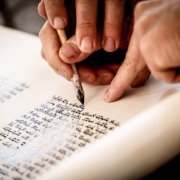Transphobia Is Not A Jewish Value
By Rabbi Mike Moskowitz (he, him)

Reb Yisroel Salanter, the founder of the modern mussar movement, taught “Not everything one thinks, should be said. Not everything that one says, should be written. And not everything one writes, should be published.” I’m writing this article because the recent transphobic one, published in Tablet Magazine, never should have been.
Thinking that support for trans and gender fluid people is motivated by financial profit is the type of offensive and harmfully ridiculous thought that belongs with others like: the Earth is flat, or that Trump is still president. It does not belong in a publication that rational people are meant to take seriously.
Healthy exchanges of varied perspectives are essential for exploring the world of ideas and developing a better understanding of complex concepts. Now more than ever, we need to come together, respectfully, in conversation about things that reasonable people can disagree about. However, there is nothing respectable or reasonable about transphobia.
Questions affecting the practices of gender-queer Jews are real, complicated, and usually person specific. As in every other area of Jewish Law there are different opinions, perspectives, and a lot more to learn. Denying the reality of the lived experiences of people doesn’t advance any thought or expand any understanding. It peddles a world of make-believe where all of the non-cis folks have been erased, and that world is most definitely flat.
Mishnah Avot 5:17 teaches that כָּל מַחֲלֹקֶת שֶׁהִיא לְשֵׁם שָׁמַיִם, סוֹפָהּ לְהִתְקַיֵּם – Every dispute that is for the sake of Heaven, will in the end endure. The dispute of Korach, קרח, is offered by the Mishnah as the paradigmatic example of one that is not for the sake of Heaven. Instead of being discerning and engaging in an exacting pursuit of being חקר, he refused to take part in an honest analysis.
Every chakira has two sides; alternative ways of perceiving something. Rashi describes Korach as being a פקח, meaning clever, but instead of advocating for the advantages of one over the other, the Zohar claims that Korach was arguing against שלום – the wholesomeness of peace. He took himself to one “צד” – side, abandoning the collective. The word “שלום” has a numerical value of 376, twice as much as “פקח” (which is 188), that relies on an appreciation of both sides – “צד”, each having a value of 94.
One of the many lessons members of the cis community can learn from our gender queer siblings is how to better simplify the complexities of coexisting identities. This is reflected in the phrase mentioned above “לְשֵׁם שָׁמַיִם” – in the name of Heaven. Tradition teaches that G-d blended fire “אש” with water “מים” to literally form the name of “Heaven” – “לְשֵׁם שָׁמַיִם”.
There are many things that are hidden and concealed from our limited grasp of the universe. Knowing what we don’t know is an important prerequisite for acquiring wisdom, and also plays a role in our faith, going past what we can see. As we discover new truths and gain additional insights we shouldn’t feel disoriented, but curious to learn more.
When Korach went out to protest, he wore a garment made entirely of תכלת – techelis (sky blue wool), asking if it required tzitzit (fringes). Our rabbis explain that Korach’s superficial confidence in his own lack of awareness contributed to his heresy and resulted in his being swallowed by the ground. The rabbis understood that the heavens aren’t actually blue, but that is simply how it appears to us when we look up at the sky. The techelis gets its name because its purpose – תכלית, is to hold the space of perspective: to see and remember there is something beyond.
The Talmud teaches that when the rabbis were about to enter into the mystical orchard, Rebbe Akiva warned them that when they reach the pure marble – שיש, they shouldn’t say “water, water” even though the stones will appear that way. Accessing deeper realities requires a belief in experiences not limited to one’s own. “שיש” is meant to be parsed ש-יש – that there is. Uncovering the Divine truth necessitates a faith in what hasn’t yet been revealed.
Feeling threatened by those who are perceived as different and responding to the unknown through hate, fear, and denial is a synthetic response to the very human reaction of knowing that we don’t know it all. Transgender, gender non-conforming, non-binary, fluid, and all the unique blends of gender identity are beautiful, holy, and part of G-d’s plan. This is a simple truth and it shouldn’t have to be written.

Rabbi Mike Moskowitz, a founding builder at Bayit and also a member of Bayit’s Board, serves as Scholar-in-Residence for Queer and Trans Jewish Studies at Congregation Beit Simchat Torah, a flagship LGBTQIA+ synagogue in New York City.









